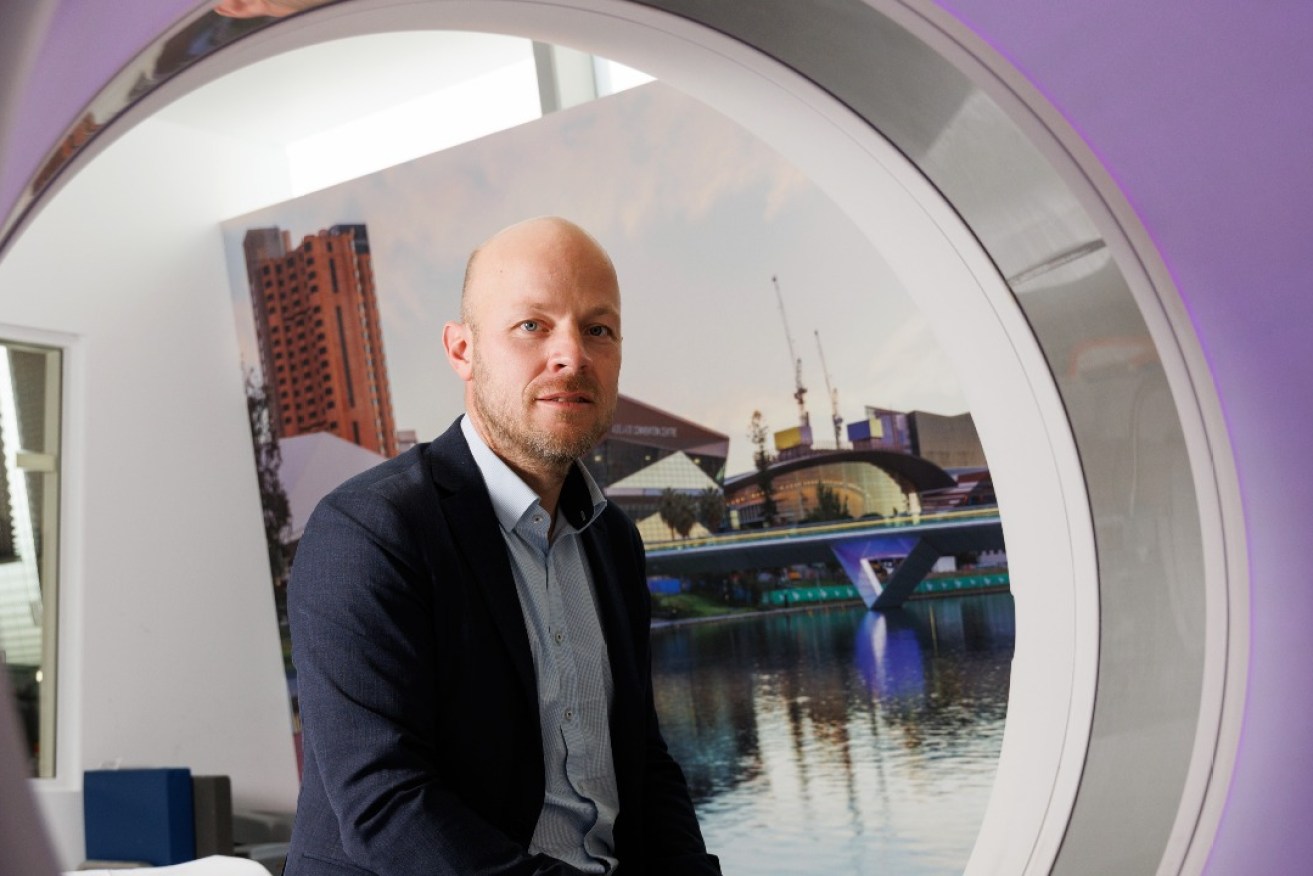
Applying AI to stay one step ahead
How SAHMRI is using technology to create better lifelong health for all South Australians.

Cardiologist Dr Johan Verjans uses advanced tools and computers at SAHMRI to detect the earliest signs of cardiovascular disease. Photo: Tony Lewis
As a cardiologist, Johan Verjans diagnoses and treats patients affected by heart and blood vessel problems.
As a clinician-scientist at SAHMRI, he uses advanced tools and computers to get one step ahead and detect the earliest signs of cardiovascular disease.
“We hope SAHMRI research projects can help predict, diagnose and guide treatment of heart disease, particularly heart attacks,” Johan says.
Trained in the Netherlands, Johan moved to South Australia in 2017 when he was appointed a leader in SAHMRI’s Lifelong Health theme.
“I was offered similar positions in Europe and Sydney, but for my wife and I, with two young children, it was a no-brainer to come to Adelaide,” says Johan.
“To be working at the cutting edge of research at SAHMRI, right next door to the new RAH for clinical work and with the lifestyle benefits of South Australia, it was an easy yes.”
Part of Johan’s work involves using the latest imaging technologies to monitor what happens inside the body.
As SAHMRI’s Group Leader in Artificial Intelligence, he’s also exploring how artificial intelligence (AI) can supplement current healthcare approaches. AI and smart computers offer the unique capability to analyse complex data.
In one of his many current research projects, Johan says a particular type of AI called machine learning may help doctors better identify who is most at risk of serious illness or death from heart disease.
“We’re not aiming to have AI take over diagnosis in hospitals,” Johan says.
“Instead, we’re looking at whether AI can support better decision-making in the emergency department.”
Heart disease is a leading cause of death in South Australia. However, some patients who come to the hospital with chest pain urgently need treatment, yet others can go home. The difficulty can be in deciding which patients fall into which category.
“We think AI could help us quickly identify which patients need immediate attention to treat or prevent a heart attack and which can be safely discharged,” Johan says.
“We’re working on a study that uses almost ten years of hospital data to help doctors make more accurate decisions and avoid errors in managing patients with chest pain.”
In addition to heart disease, the Lifelong Health theme on Level 6 at SAHMRI targets gut disease, diabetes, men’s and mental health, wellbeing, stroke and dementia. SAHMRI’s other research themes focus on medical and social challenges for Women & Kids, in Precision Cancer Medicine and in Aboriginal Health Equity (Wardliparingga).
Johan says his team is currently working on AI projects across these themes.
“AI is an area of huge research interest in medicine from heart attacks to cancer, to brain disease, to broken bones, to resource allocation and more,” says Johan.
“We’re working across the many research programs at SAHMRI and with university collaborators to explore how AI may be useful in many areas of healthcare.”
Johan and his SAHMRI colleagues use the state-of-the-art facilities inside the futuristic building to conduct research informed by the latest knowledge and technology. They travel in and out of the building to work with hospitals, pathology services and patients to ensure their research is connected to real clinical care.
“At SAHMRI, we work closely with all parts of the medical ecosystem so everyone can benefit from new healthcare technologies in South Australia,” Johan says.
“Adelaide is also part of an international alliance of top AI centres in medicine, including Harvard and Stanford, that meets regularly to collaborate and ensure AI remains ethical and safe for patients.”
“In Adelaide, we are currently world leaders in AI and image analysis; with the right support, we have a huge opportunity to become leaders in AI for health,” says Johan.
In addition to world-class researchers, SAHMRI also houses essential resources and infrastructure that service South Australia. These include technology and tools to support research and produce diagnostics, registries to track health data and trends, and centres to translate research into policy and effective health responses, including for COVID-19.
SAHMRI is South Australia’s independent, not-for-profit health and medical research institute. Its primary reason for being is to provide service to the community.
SAHMRI researchers work closely with each other and the world’s best medical experts to find better ways to treat, heal and care for people.
While they receive some grants from state, national and international funding bodies, community support is vital to boost the pace of research. Donations can put the latest technology into the hands of the SAHMRI team and give talented younger researchers the seed funding they need to bring their ideas to life.




